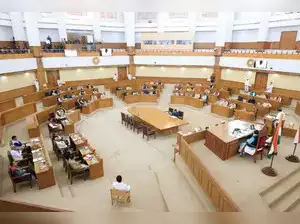The Tripura government has announced a substantial hike in the salaries of its Members of the Legislative Assembly (MLAs), with increases of up to 92%. The move has sparked significant discussion across the state, with proponents highlighting the need for parity with other states and detractors questioning the timing of the decision.
Details of the Salary Hike
The revised pay structure will see the monthly salary of MLAs rise from ₹55,000 to ₹1,05,500, marking a nearly two-fold increase. Similarly, the salaries of the Chief Minister, ministers, and other senior officials have also been raised significantly. For instance, the Chief Minister’s salary has been increased from ₹65,000 to ₹1,20,000 per month, aligning with similar hikes across other northeastern states.
The decision to increase salaries was made during a special session of the Tripura Legislative Assembly, where lawmakers unanimously approved the revised pay structure. “This adjustment is long overdue. It reflects the rising cost of living and the responsibilities shouldered by public representatives,” a senior government official said.
Rationale Behind the Decision
According to government officials, the hike is aimed at ensuring that the remuneration of MLAs is commensurate with the increasing demands of governance.
“Tripura MLAs have been among the lowest-paid legislators in the country. This revision not only brings their salaries on par with other states but also serves as recognition of the growing administrative and legislative challenges they face,” said a government spokesperson.
The revision also includes enhancements in allowances, such as travel and constituency-related expenses, to support MLAs in effectively serving their constituencies.
Public Reaction
The decision has received a mixed response from the public. Many have criticized the timing of the hike, given the state’s ongoing struggles with unemployment and economic challenges. “While the government is announcing job creation initiatives, a 92% salary hike for MLAs seems excessive. The focus should be on addressing the needs of common citizens,” said a resident of Agartala.
On the other hand, some argue that the hike is justified, considering the rising inflation and the increased workload of legislators. “If we want competent individuals to enter politics and serve the public, they need to be fairly compensated,” said a political analyst.
Comparisons with Other States
The salary revision in Tripura is part of a broader trend across India, where state governments have been revising the pay of their legislators. For example, MLAs in states like Gujarat and Karnataka already receive salaries exceeding ₹1 lakh per month. Tripura’s new pay structure now places its MLAs on par with many of their counterparts in other states, though it still remains below the national average.
This alignment is seen as a step toward ensuring equity and competitiveness in political remuneration, encouraging talented individuals to enter public service.
Financial Implications
The hike in salaries will increase the state’s expenditure on legislative pay. However, government officials have assured that the fiscal impact will be minimal and manageable within the existing budgetary framework.
“The additional expenditure is a small price to pay for fostering an efficient and motivated political leadership,” said the state finance minister.
Critics, however, argue that these funds could have been better utilized for public welfare programs, particularly in rural areas where poverty and lack of basic amenities remain significant challenges.
Balancing Perception and Progress
The salary hike brings into focus the delicate balance between ensuring fair compensation for lawmakers and addressing the expectations of the public. While the move aims to modernize political remuneration in Tripura, it also underscores the need for greater transparency and accountability in governance.
As Tripura continues to address its developmental challenges, including unemployment and infrastructure gaps, the government’s decision will likely remain a topic of intense debate. The focus now shifts to how effectively legislators utilize the additional resources to serve their constituencies and address the pressing needs of the state.
Looking Ahead
The salary hike for Tripura’s MLAs marks a significant shift in the state’s political landscape. While the immediate reactions may be polarized, the long-term implications will depend on how this decision translates into better governance and development outcomes.
With public expectations running high, the state’s lawmakers face a critical test in justifying this enhanced remuneration through improved performance and accountability. The coming months will reveal whether this bold decision serves as a catalyst for progress or fuels further criticism of political priorities in Tripura.


